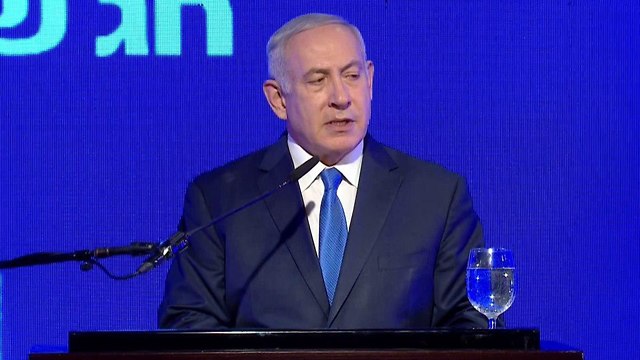

Netanyahu's Case 4000: Cashbox for flattery
Op-ed: When assuming office, Prime Minister Netanyahu insisted on one thing he couldn't have—the communications portfolio. He wanted to even the score because to him, the media is the enemy and the solution is to conquer it by force. As a result, the deal with Elovitch felt so natural, it didn't even feel like bribery.
The fourth and current government of Prime Minister Benjamin Netanyahu was established on May 14, 2015. During the coalition negotiation process, the prime minister made far-reaching concessions to Finance Minister Moshe Kahlon (Kulanu), Education Minister Naftali Bennett (Bayit Yehudi) and to the ultra-Orthodox parties. In return, he insisted on one thing: to serve as communications minister as well as prime minister.
In addition, the coalition will commit, in advance, to supporting any decision he makes as the minister of communications. Netanyahu did not insist on the coalition's commitment to other issues like the Greater Israel, national security, the preservation of democratic values or the sanctification of the Jewish nation.
Netanyahu was only interested in the media. He was obsessed, according to people who participated in the negotiation process. He behaved like a child who had access to all the toys in the store, but he wanted just one toy—the one he was not allowed to touch.
The Ministry of Communications was born out of the Ministry of Postal Services: a modest, essentially technical, regulatory work, which experts committees recommended closing down repeatedly in order to establish a clerk-run authority instead. Since during the negotiation process there is always someone who is left without a portfolio of any kind—the ministry wasn't shut down. It became an office for losers.
The prime minister wanted to be in command of the Ministry of Communications not because he wanted to run it, but because he wanted to even the score. The enemy is the media. The key is to conquer it by force.
What Sheldon Adelson did to the print media, would be done to websites and television channels. Shaul Elovitch, the chairman and main shareholder of Bezeq will be the first: his news site will take order from the prime minister's residence on Balfour Street. If he behaves, he will benefit from the ministry's regulatory powers. Then others will follow. Let every tycoon and oligarch know—those who behave—enjoy the pleasures of government.
In his fourth term, Netanyahu chose to be a vigilante—the poor man's Charles Bronson (American actor who was often cast as a vigilante in films with revenge-oriented plot lines—ed.), if you will. The opposite happened to Ariel Sharon: Sharon was at peace when he took office. He wanted to charm his opponents, not to break them. Netanyahu took office in a rage—obsessive and seeking revenge.
At the time, I wrote that Netanyahu's insistence on taking on the communications portfolio must end with a State Comptroller investigation, if not with a police investigation. The writing was on the wall: government regulation overpowered by personal agendas; the dismissal of a professional CEO in favor of a political trustee who lacked skills; the appointment of lawyers—the prime minister's cousins—who specialize in communications; and a controlling shareholder of a large communications company that suddenly becomes—along with his wife—a close friend.
I never met Elovitch. People who worked with him in the past claim he's not unpleasant, but rather a positive individual who bit off far more than he could chew. Then came Netanyahu and promised to approve all of his requests, and give him a gift that would make him the richest man in the country. It was an offer that could not be refused.
Yes, the timing of the police recommendations' publication was a bit off. "How can you do such a thing on the eve of the holiday," Minister of Social Equality Gila Gamliel (Likud) exclaimed Sunday. Hanukkah, which is considered a minor holiday in our tradition, suddenly became the most sacred Jewish holiday. "When you will have prepared the slaughter for the blaspheming foe," Netanyahu's Likud followers chanted.
Yes, the outgoing Police Commissioner Roni Alsheikh gave an unsuccessful interview to Ilana Dayan, as far as he's concerned. The claim that the prime minister had police investigators followed hasn't been proven. However, One mustn't forget what Netanyahu did to Alsheikh: he appointed him, at first, and then, upon realizing that Alsheikh was faithful to his job, and not to Netanyahu, he launched an insult-driven campaign to humiliate the police commissioner. Alsheikh did not take office to incriminate the premier. Netanyahu brought this upon himself.
Yes, police investigators' involvement in the relationship between news sources and media is extremely problematic, to say the least. The media in a democratic country cannot operate properly without having access to sources. There is an element of give and take in this relationship; we mustn't let it become a criminal offense.
All these reservations melt away when placed against the serious findings of the joint Tax Authority and police investigation. Elovitch was not a media person and Netanyahu was not his source. If the police are right, they made a profitable deal—cashbox for flattery—NIS 1 billion for positive news coverage. The deal felt so natural that it did not even occur to them that it was bribery.
Nevertheless, the police recommendations are not the end of the story. Attorney General Avichai Mandelblit and the State Prosecutor's Office, who were deeply involved in the investigation, will not be able to escape its conclusions. The police have set a high standard for Mandelblit, but how he will deal with it remains to be seen.


















